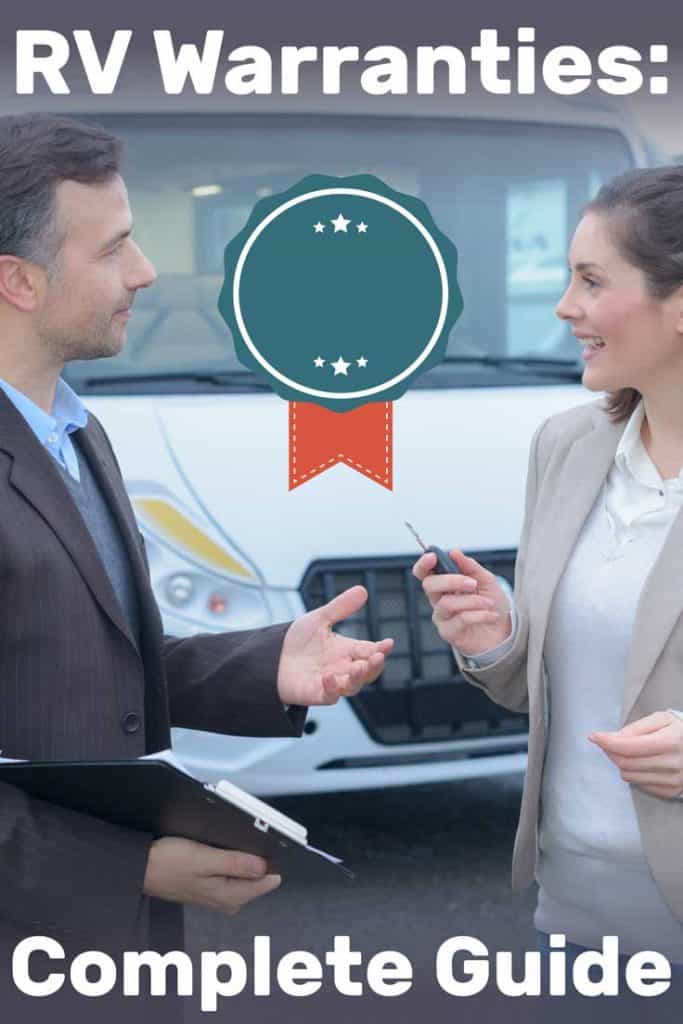I wanted to share this guide to RV warranties because warranties can be confusing. This can cause anxiety because if we don't understand them correctly, it can cost thousands of dollars in RV repairs that aren't covered.
 After looking into warranties, I've been able to clarify some details such as:
After looking into warranties, I've been able to clarify some details such as:
- An owner should acquire an extended warranty once the original warranty expires.
- An exclusionary warranty gives more detail on coverage than an inclusionary warranty.
- How to decide if it's best to have a warranty or put away savings and pay for repairs yourself.
- What causes some repairs' acceptance/rejection for coverage.
- What other RVers have to say about their experiences.
Surprisingly, four different labels/definitions for wear and tear apply legally. Consequently, most vehicles have about four: premature wear, gradual deterioration, and general wear and tear.
In addition, usual deterioration, and normal wear also show up in warranties. Extended warranties usually involve these definitions. It's no surprise there is some confusion about warranties. Read below for more information.
What Does an Original Warranty Cover and How Long Does It Last?
Warranties vary from company to company. Original warranties may cover repairs anywhere from one to five years. The coverage also depends on the parts or systems.
As an example, some basic information on Jayco warranties shows that Jayco offers a 2-year, limited warranty. The warranty lasts for the first two years, or 24,000 miles. The manufacturer offers this coverage and not a dealership.
This warranty covers defects in materials and workmanship. Jayco also covers much of the frame and other parts for five years. Close inspection of your warranty should always avoid a surprise later.
Other companies or dealerships may offer a warranty on a new engine for five years or a certain number of miles. Some parts may be covered for a shorter time by a warranty such as those needed for suspension. Other warranties may only offer one year of coverage from the date of purchase.
Who Covers the Repairs Under Warranty?
If the RV is still under its original warranty, most likely the repairs will be covered by the manufacturer. There are some dealerships that may offer warranties. These are usually extended warranties, however, and may be bought after the original warranty expires.
A well-known dealership for both new and pre-owned RVs, Camping World, for example, features not only repairs but also equipment and gear for RVs.
Camping World also offers the Good Sam Club which provides many services for RVs including extended service plans, roadside assistance, and insurance.
The extended service plans, advertised as better than a traditional warranty, cover all types of RVs as well as trucks and autos. Considered mechanical breakdown insurance, the extended service plan covers the US and Canada.
To find out more about Camping World's products and services, take a look at their website here.
Where Can I Find an Extended Warranty?
You'll find that the extended warranty coverage can come from manufacturers, dealers, or warranty companies. Wholesale Warranties, an independent warranty company, covers both RVs and vehicles. Wholesale Warranties provide different types of coverage, including exclusionary policies, (we'll go over those in a few minutes), listed component coverage, and powertrain coverage.
Available specialists help you through the process. The company does require pre-authorization for all repairs with a deductible for each visit. Wholesale Warranties make payment directly to the repair shop. For more information, check out the website here.
Why Should I Purchase an Extended Warranty?
With the increase in technology in RVs and travel trailers, the expense of repair for both materials and labor increases also. Labor alone can sometimes cost up to several hundreds of dollars an hour.
Also, many states exclude RVs from the protection of lemon laws. Manufacturers may cover the coach with their warranty, but the items that are installed, such as appliances may not be covered.
Check this detail out before purchasing. You may be surprised how difficult it is to find coverage for installed items.
When Should I Purchase an Extended Warranty?
An Extended Warranty is needed if your RV is no longer covered by its original warranty. Another instance when an extended warranty would be beneficial would be if you purchased your RV from a private owner.
If the original warranty doesn't transfer to you, an extended warranty might be of benefit. Winnebago does allow their basic warranty to transfer to a new owner as long as the original warranty is still valid.
However, if you have just purchased a new RV or travel trailer, purchasing an extended warranty in addition to the original warranty included with your new RV usually provides no additional benefits.

What is Warranty Forever?
This warranty promises lifetime coverage as long as your RV or travel trailer belongs to you. Accordingly, this applies to both new and pre-owned RVs from participating dealers.
For your RV or travel trailer to remain covered, you agree to complete certain maintenance yearly on your RV. Next, owners must submit the paperwork to show this. This maintenance includes checking the following items.
- roof and seal
- axles and hub and lubrication
- Check the furnace
- Clean the control compartment
- Check the gas line for leaks
- Check the hot water heater including flushing the tank
If owners comply with the maintenance requirements, however, no limit applies on time or mileage with the warranty. Labor and parts are covered at 100%. For more information, take a look at the website here.
Do I Really Need an Extended Warranty?
This question has different answers. It really depends on your comfort zone and income. Additionally, the age of your RV plays a factor. RVers typically have several responses to this question.
Before we look at those responses, I do want to stress that most people encourage shopping around instead of buying from the manufacturer. The general belief is you'll find a less expensive deal.
Also, before choosing to purchase an extended warranty, look at the age. If it's an older pre-owned RV, you'll likely want to replace the item rather than repair it. Other opinions are that the extended warranty is an expense that won't pay for itself.
Some RVers suggest putting money aside instead of buying an extended warranty. Many of them state that they have money left over when the warranty would have expired. Others insist that an extended warranty pays for itself, often in the first year.
Yet a fourth group are the ones who never buy extended warranties. However, they chose to invest in an RV extended warranty because they're not very handy. Members of the not-so-handy group are often glad they did purchase the extended warranty.
Do You Need an Extended Warranty?
Before purchasing an extended warranty, ask to take an extra form home to read over. Make sure you understand the difference between inclusionary coverage and exclusionary coverage.
An inclusionary list refers to things the warranty will cover. If it doesn't show on the list, it won't be covered. An exclusionary list, however, details non-covered items as well as covered.
Check to see which category the extended warranty falls in. Both take care of repairs that would be costly. The writers of the warranty understand the average number of repairs and their costs for an RV.
Once they consider this, they can add to the profit. The warranty company will make money, but may also prevent you from having to pay for a costly repair.
An Exclusionary Warranty Covers Repairs in More Detail
One exclusionary warranty I read promised to help with mechanical breakdowns. However, the warranty would not cover damage by weather, vandalism, or collision.
It wouldn't cover maintenance and a whole host of items that may need attention. What it did cover were items such as the engine, transmission, air conditioner, heating assembly, slideouts, and leveling jacks.
The warranty did not cover pre-existing conditions. Exclusionary warranties are often thought to be more comprehensive and detailed. An inclusionary warranty often only states what it will cover without discussing what isn't covered.
When Does a Warranty Not Cover a Repair or Item?
If you take some time and read the forums, you'll see some of the hard lessons that RV owners have learned.
For instance, if your electric jacks need replacing after seven years, the manufacturer may not cover them because the parts are discontinued. The owners are suspicious that the manufacturer knew the parts were substandard, to begin with.
Other difficulties that owners have talked about include:<
For needed repairs, the extended warranty company cuts one check per repair occurrence. If parts come from another company, this posed a problem. The extended warranty company refused to pay a previously agreed upon amount.
With many hoops to jump through for one extended warranty company, it took months to resolve after first paying several thousand out of pocket and trying to get reimbursed. In some instances, the company refused to pay.
The warranty company would pay only the number of hours of labor their book said the repair should take. The company would also pay only what their book said a part should cost instead of the actual cost to the owner.
Repair shops often will not call the warranty company, leaving the task up to the owner. The owner then struggles to get repairs covered.
Unfortunately, not reading the small print can have adverse consequences. In checking over some warranties myself, I found them to be a little vague in what would be covered. Phrases like 'components will be covered' were used.
The reader wonders which components the warranty refers to. Some owners recommend having the warranty checked by an attorney before signing. Paying a couple of hundred dollars to possibly save a couple thousand could be of benefit.
Experiences of Satisfied Customers
Before you run away from extended warranties, these positive comments expressed by owners described the same companies:
The extended warranty covered the repairs to my leveling jacks. I had the hydraulic pump, solenoids, and leveling jacks replaced. The extended warranty covered all of it. I only paid for the deductible. Our RV has needed repairs, both major and minor. The warranty covered them all.
What Causes Some RV Repairs Coverage/Rejection
One theory is that different warranties have different underwriters. This may make a difference.
These owners also credit the coverage of their expenses to the fact that the repair shop knew how to write up the paperwork properly. As a result, the warranty company would cover the expenses.
Checking with your warranty company for paperwork requirements and making sure the repair shop is aware of these could mean the difference in whether the repair is covered.
Another step RVers might take is to request to look over the paperwork tactfully before the repair shop submits it to the warranty company. One manufacturer, for example, requires the paperwork written in a certain order. It also must include several particular details.
Miss one detail and there will likely be no coverage. One could see why a repair company is reluctant to take on the task. Some owners report that shops insist the owner interact with the warranty company.
Can the Question Regarding Warranties Be Simplified?
All of this information is a bit much to take in. Boil it down to just a few factors. When the cost of replacing some appliances and fixing hydraulics keeps you from RVing, get a good extended warranty at a reasonable price.
If you can afford the repairs, mull over the above information. Make the best decision for you.
Written by Donna Gum, who owns a motorhome in West Virginia.

I have yet to find an article that mentions the cost range of an extended warranty? This is what I specifically searched for. ALot of words here, but no answer to my question.
Thanks for the feedback! We’ll look into adding that in a future revision.